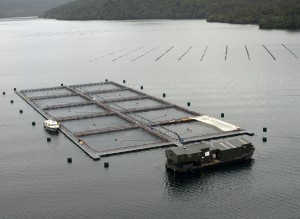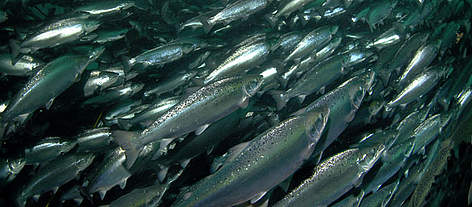 As the world’s fisheries come under ever increasing demand and pressure, many companies and countries around the world are turning to aquaculture, the farming of fish, crustaceans, aquatic plants, and shellfish. But is this method of producing food the “green” answer it is often claimed to be?
As the world’s fisheries come under ever increasing demand and pressure, many companies and countries around the world are turning to aquaculture, the farming of fish, crustaceans, aquatic plants, and shellfish. But is this method of producing food the “green” answer it is often claimed to be?
Aquaculture is not a new concept by any means, there is evidence that suggests the farming of aquatic life was taking place as early as 6000bc on what could be called a commercial scale.
The modern age has mechanised, computerised, and scaled up this concept of food production into one of truly immense proportions. South America alone produces over a startling one million metric tons of farmed salmon per year, with methods some have described as unsustainable.
Globally, aquaculture has been a very erratic business in the last 40 years, with major outbreaks of disease wiping out hundreds of thousands of tons of fish at a time, and poor practices responsible for localised environmental changes, and pollution on a large scale.
A huge steel or plastic floating structure, anchored in place and powered by massive diesel generators has become the standard sea farm with what is described as a “footprint” devoid of life beneath it, that may extend some distance depending on local currents and conditions.
 Is this what Jacques Yves Cousteau envisioned when he made the following famous quote?
Is this what Jacques Yves Cousteau envisioned when he made the following famous quote?
“We must plant the sea and herd its animals using the sea as farmers instead of hunters. That is what civilization is all about – farming replacing hunting.”
But then, if one considers the reality of the world we live in, where violent conflict is an everyday occurrence, populations continue to grow and people go hungry …… then I think aquaculture is a step in the right direction.
 It could be argued that most aquacultural products demand a premium and in many countries are beyond the means of the average consumer. And this would be quite correct in many cases, but may in some part be off-set by the direct benefits to the local economy through job creation and a direct boost to the local economy.
It could be argued that most aquacultural products demand a premium and in many countries are beyond the means of the average consumer. And this would be quite correct in many cases, but may in some part be off-set by the direct benefits to the local economy through job creation and a direct boost to the local economy.
The single greatest benefit aquaculture is receiving at the moment is technology. Automated systems deliver pellets to fish in a highly measured manner and consumption is monitored in points of a percentage. Geneticists are carrying out selective breeding programs so only the most efficient of stock are sent to sea and environmental monitoring is carried out using an array of high tech sensors and systems.
Water quality tests and histologies are carried out on site and the training requirements of staff are increasing exponentially in order to keep up. Thousands of scientists are busy scuttling about, working day and night on improving “feed conversion ratios” or the amount of feed in kilograms it takes to grow a kilogram of product.
 Something that possibly started out as an art form has become a science.
Something that possibly started out as an art form has become a science.
 With increased use of technology, coupled with a strong social conscience, aquaculture just may be the answer to many of the world’s problems, which it could be argued are largely driven by increasing population and dwindling resources.
With increased use of technology, coupled with a strong social conscience, aquaculture just may be the answer to many of the world’s problems, which it could be argued are largely driven by increasing population and dwindling resources.
As long as mankind uses this tool as a farmer and not the hunter we have descended from, then I see aquaculture playing a very strong role in mankind’s future.
10 thoughts on “Aquaculture – mankind’s future?”